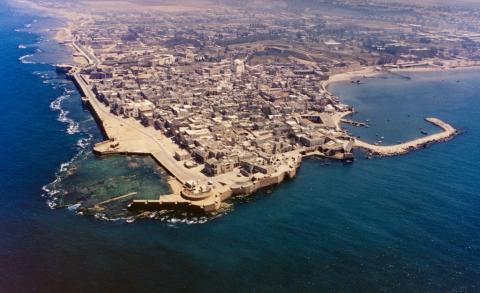‘Abdu’l-Bahá’s love of God and Bahá’u’lláh brought a calm and a serenity which adverse circumstances could not shake, whether it be shots fired in the night, chains, locusts, bombardments of Haifa, or the threat of death. For example, He did not wish to conceal the chains with which He was ‘paraded through the streets’ accompanied by friendly soldiers. In 1915 locusts destroyed the vegetation. For months news from the Bahá’í world did not reach Him and Haifa endured three bombardments. Lua Getsinger wrote that it was wonderful to witness the calm majesty of ‘Abdu’l-Bahá as He went about among the people, whose only hope and help He was.
Peacefulness
Strive day and night to attain to this exalted state. Look at me! Thou dost not know a thousandth part of the difficulties and seemingly unsurmountable passes that rise daily before my eyes. I do not heed them; I am walking in my chosen highway; I know the destination. Hundreds of storms and tempests may rage furiously around my head; hundreds of Titanics may sink to the bottom of the sea, the mad waves may rise to the roof of heaven; all these will not change my purpose, will not disturb me in the least; I will not look either to the right or to the left; I am looking ahead, far, far. Piercing through the impenetrable darkness of the night, the howling winds, the raging storms, I see the glorious Light beckoning me forward, forward. The balmy weather is coming, and the voyager shall land safely.
‘Abdu’l-Bahá did not permit the pressures of travel to ruffle Him. Once while in Great Britain when it was time to depart for a journey secretaries and friends were ready to leave for the train He remained ‘calmly writing’. Reminded that it was time to leave, He quietly replied, ‘There are things of more importance than trains.’ He continued to write. ‘Suddenly in breathless haste a man came in, carrying in his hand a beautiful garland of fragrant white flowers. Bowing low before the Master, he said: “In the name of the disciples of Zoroaster, The Pure One, I hail Thee as the ‘Promised Shah Bahram’!”‘Then the man, for a sign, garlanded ‘Abdu’l-Bahá, and proceeded to anoint each of all of the amazed friends who were present with precious oil, which had the odour of fresh roses.
‘This brief but impressive ceremony concluded, ‘Abdu’l-Bahá, having carefully divested Himself of the garland, departed for the train.’
Even during those crowded days in London the Master never appeared tense or frustrated, wondering how He could do all that seemed to be required of Him. He knew His purpose and thus all things fell into their proper perspective.
The calm with which ‘Abdu’l-Bahá walked His ‘chosen highway’ endured until the very end of His earthly life. When He knew that His time had come He did not accept the food offered Him, saying, ‘You wish me to take some food, and I am going?’ He gave His two daughters ‘a beautiful look. His face was so calm, his expression so serene, they thought him asleep.’
